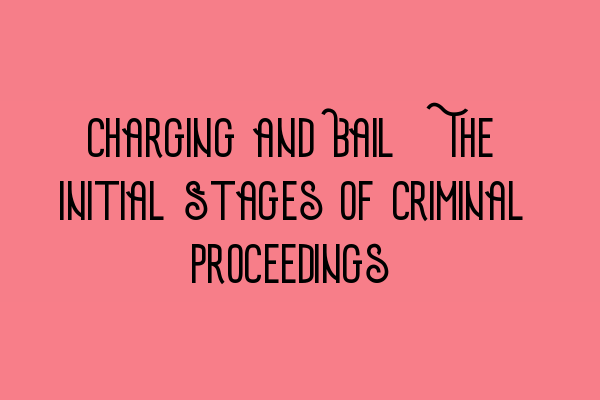Charging and Bail: The Initial Stages of Criminal Proceedings
In the criminal justice system, the process of charging and granting bail to a defendant marks the initial stages of criminal proceedings. This crucial phase sets the tone for the entire case and significantly impacts the defendant’s rights and liberties in the legal sphere. Understanding the intricacies of charging and bail is essential for both legal practitioners and individuals involved in criminal cases.
The Charging Process
Charging occurs when law enforcement authorities formally accuse an individual of committing a crime. This typically follows an investigation, whereby the police gather evidence to support the charges. Once they have sufficient evidence, the authorities will formally charge the person, stating the specific offence they are accused of.
It is important to note that charges should be based on reasonable grounds and supported by evidence. Prosecutors play a pivotal role in ensuring that charges are valid and meet the necessary legal standards. They review the evidence and determine whether there is sufficient merit to proceed with the case.
During the charging process, individuals have the right to hire solicitors who specialize in criminal law. These solicitors provide legal advice and assistance to defendants, ensuring their rights are protected throughout the proceedings. Expert solicitors at SQE Criminal Law & Practice Law UK are well-versed in handling charging matters and can guide defendants through this challenging phase.
If you are studying for the SQE exams, it is crucial to understand the role of charging in criminal proceedings. Practice is key to mastering legal concepts. You can enhance your knowledge and test your understanding with our SQE 1 Practice Exam Questions to prepare effectively for your examination.
Bail: Presumption of Innocence
Once a defendant has been charged, the next consideration is whether to grant bail or remand the accused in custody. In criminal law, bail refers to the temporary release of an accused person pending a trial or further legal proceedings.
In the United Kingdom, there is a presumption of innocence until proven guilty, and defendants are generally entitled to bail unless certain criteria are met. These criteria include the likelihood of the defendant absconding, interfering with witnesses, or committing further offences while on bail.
The decision to grant or deny bail rests with the courts. Factors such as the seriousness of the offence, the strength of the evidence, the defendant’s criminal record, and their ties to the community are considered when determining bail applications.
For legal professionals seeking to enhance their knowledge of bail procedures, SQE Criminal Law & Practice Law UK offers comprehensive SQE 2 Preparation Courses. These courses cover all aspects of criminal law and practice, including bail applications, to ensure solicitors are well-prepared to serve their clients.
Defendants who have been denied bail have the right to challenge this decision. This can be done through a bail appeal, where the court reviews the initial decision and reconsiders whether the defendant should be granted bail.
As legal practitioners, we understand the significance of charging and bail in criminal proceedings. Our team at SQE Criminal Law & Practice Law UK is dedicated to providing expert guidance and support to defendants and legal professionals alike. To further prepare for the SQE exams and familiarize yourself with the legal landscape, we offer SQE 1 Practice Mocks FLK1 FLK2 to help you excel in your studies.
It is important for both legal professionals and individuals involved in criminal cases to stay updated on key dates and deadlines. The SRA SQE Exam Dates provide valuable information on examination schedules and timelines. Ensure you are well-informed by visiting our article on SRA SQE Exam Dates.
Charging and bail are critical aspects of criminal proceedings, shaping the trajectory of a case. By staying informed and seeking expert legal advice, defendants can navigate through these preliminary stages with confidence. At SQE Criminal Law & Practice Law UK, we are committed to providing comprehensive support and guidance to individuals involved in criminal cases. Contact us today to ensure that your rights and interests are protected.
